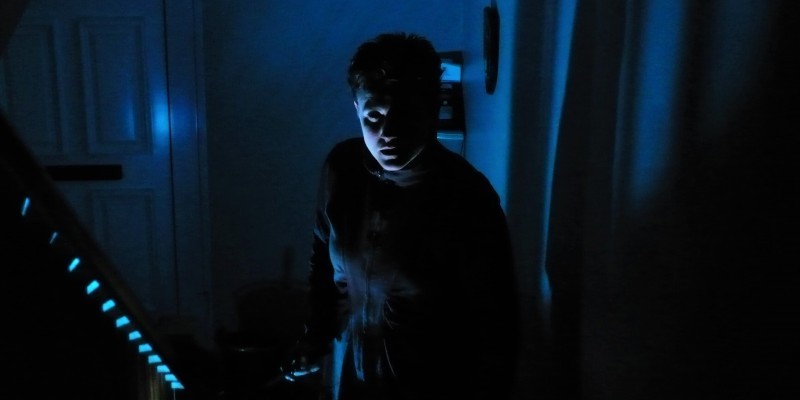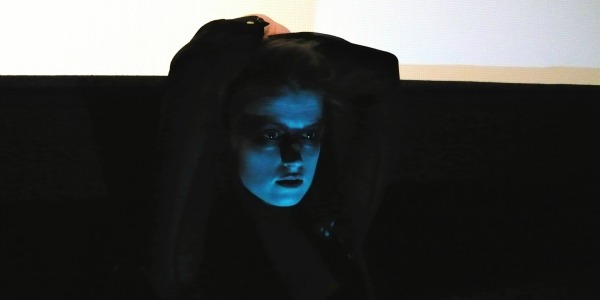NIGHT PEOPLE: How Do You Know You’re In A Bad Movie?

I got started watching avant-garde film at Oklahoma State University…
Sometimes watching a movie can feel like a duty. Maybe that’s because I take movies too seriously sometimes (okay, maybe all the time). But explaining why a movie fails is fraught with questions about my own expectations of a movie as they relate to the quagmire of unknowns about the creators’ intentions, let alone the practical budgetary constraints and other contingent aspects of an independent or studio production.
Maybe it’s because Night People tries really hard to be a good movie that it is so painful to write this review. There is an earnestness to the performances that makes you want to forgive the actors, but the characters never have life because the acting is overwrought, with some truly cringe-worthy moments that completely remove the viewer from the story.
The story is a whole other problem. Even with a more convincing, nuanced performance from the cast, this script is nonsensical – a hodgepodge of wild ideas with only the haziest of through lines.
Now, here is where the question of the filmmakers intent rears its chimeric head. The question is, to me, whether we should expect narrative exposition and to what extent– does Night People want to be seen as a movie with, let’s call it, a conventional narrative? Or, are the filmmakers trying to do something more interesting by intentionally defying narrative expectations? The stakes are clear– either provide narrative fulfillment or risk jettisoning viewers from the narrative and calling attention to the constructedness of the movie.

Sometimes, tossing viewers into this critical space is the intention of the creator, often to allow for a critique of another order – by calling attention to the act of spectating, the filmmaker makes the audience aware of their own complicity in the cinematic illusion. Other times, when viewers are pushed into their own critical thoughts rather than the world of the film, it is the result of a total cinematic failure, the failure to create a sense-world of experience for audiences or to make meaningful use of visual styles to demonstrate cinematic qualities, such as the play of light in time, color and sound as emotive devices, or framing as a thematic concern.
How can we, with all due humility, look at a serious movie and call it a failure?
What Is This Movie About? An Honest Question.
The plot of this movie has taken me an unusual amount of time to discern, and even longer to evaluate. And it doesn’t seem like the confusion is done purposefully, or at least not in a sophisticated way. The movie tries to tell three parallel stories that coincidentally intersect around a bizarre blood cult.
The majority of the movie drags slowly, lingering on shots and extending empty scenes with seemingly no unified direction. Eventually, three subplots emerge with little or no connection until, an hour and a half later, you have completely forgotten if this movie is about aliens, fetishism, ghosts, or vampires. In the end, it’s about all that and none at the same time.
The movie features this weird, pyramid shaped object with cryptic writing on it, which has some mysterious powers and is a machine from the future, or the past – nobody cares about its origin. It does magical things in the movie, like make people vanish into what we can vaguely infer is a ghost-like, liminal afterlife. Maybe this device moves the person into another dimension that exists slightly next to ours, causing them to only exist in some kind of ectoplasmic, nocturnal state. Who knows?

A second, even more confusing McGuffin in the movie is the blood sucking device that looks like somebody’s poor recollection of Guillermo del Toro’s creepy gadget in Cronos. This mystery device, we are left to guess, plays some role in powering the extra-dimensional transporter thingy and is the main tool of what seem to be a group of vampires, loosely understood.
With no explanation, this is all too unclear, and even in the movie’s final minutes, subplots emerge that have no clear relation to any overall story. Maybe I am dense, but I can’t actually tell you what this movie is about, and it’s not for lack of trying.
So, most of my own confusion and dissatisfaction is based on my expectation to learn something more than I did about these objects. Is this a fair expectation? If this movie had David Lynch’s imprimatur on it, would I be more receptive to its open-ended, seemingly de-centered narrative?
How Far Will You Go
Directors and producers can earn an audience’s willingness to stay attuned through a discontinuous plot. We could cite any number of famous, Hollywood directors who have dispensed with linear, conventional storytelling in one or more of their movies. Even in independent movies, directors like Xavier Dolan demonstrate that with good art design and cinematography, even a seemingly boring or derivative plot can explode with dramatic tension, comedy, and eroticism.
In my opinion and viewing habits, story can be an enjoyable backdrop for an affecting engagement with the audiovisual experience of cinema. When a story is not present or is unenjoyable for whatever reason, a movie can still provide visual satisfaction.
But when a story gets in the way, you are unable to accept the movie’s invitation into its world. In this moment of being outside the movie, trying to look in, all that presents itself are the flaws of the movie which cast you out of the cinematic world to begin with. Maybe if I knew what the blood sucking gadget was I would be less likely to notice that it looks like a cheap prop from a Halloween store glued onto a hair clip. But when I am not fully strapped in and engaged with the movie, the whole thing starts to look ridiculous.

And here I am faced with my real question– how do I look at the work of a group of serious, professional entertainers and producers and say it is rubbish without somehow asserting that I am a more qualified arbiter of what is good and bad in a movie? I feel this limitation all the more presently because, unlike the product of a major studio or an established indie director, Night People is a debut feature film, not only for its director (Gerard Lough) but also most of the cast.
Hesitant, Not Unwilling
So, with my hangups clearly laid out before you, I confess that this movie is dreadful. Even if the characters were engaging, I would be left dissatisfied with the narrative because it gives no development, no clear crisis to be resolved. Because the characters are not engaging, all I can think about while watching this movie is how bad the actors look while delivering their lines. I am hesitant to call this bad acting simply because that seems to miss the point– this is a bad script without any redeeming photographic intrigue. The acting is so consistently bad that it gives credence to the possibility that the direction was consistently bad, as were the lines.
B-movie does not need to stand for bad movie. But some movies just don’t warrant much praise, and Night People is at the head of that list. But I am left wondering whether my viewing lens is too prescriptive, too predetermined by Hollywood conventions, to view Night People on its own merits and for what its creators hoped it would be. My sense is that I missed something, that I should keep struggling to find that redeeming quality which the creators must believe they achieved.
In the end, I can only guess, as with so much about this movie, about what the creators thought viewers would enjoy. Maybe the delayed introduction of seemingly important plot points is meant to build intrigue, probably so. Instead it is just confusing as hell. Even if you can keep yourself interested enough to guess your way through all the plot holes, the acting is made worse by the shot selection, with far too many close and medium close ups revealing goofy facial expressions and case studies in overacting, all of which add up to an amateurish quality that makes this movie look homemade in the worst sense.
I hope I missed something, because otherwise this movie is a sad project. What do you think? How do you know when a movie is intentionally denying your pleasure for its own end? Am I using the wrong scorecard?
Does content like this matter to you?
Become a Member and support film journalism. Unlock access to all of Film Inquiry`s great articles. Join a community of like-minded readers who are passionate about cinema - get access to our private members Network, give back to independent filmmakers, and more.
I got started watching avant-garde film at Oklahoma State University at an event called Exciterbulb. Through this I have been fortunate to view a decent number of rare avant-garde films, and accounting for these technological miracles is my main intellectual curiosity in life. I view and review movies of all sorts, and in general I never shy away from a pointless debate.












